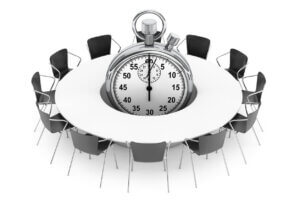Managing the Session Time
One of the primary responsibilities of the facilitator is to manage time during a session. I suspect however, that as veteran facilitators, we all have had issues managing time in a session or two, or three, or hundred! Try the steps that following for keeping your session running on time.
1. Use a detailed agenda with the duration, start and stop time estimates for each discussion item. Below is a sample extract of a detailed agenda.
Plan Start: 9:30 AM
BASIC IMPROVEMENT MODEL- B. How does the Process Work Today?
Plan Stop: 10:00 AM
Estimated Time: 30 mins
5 min (intro) + 10 steps@ 2 min + 5 min (close)
– Processing and distributing checks – Reconciling bank statements – Interfacing with the general ledger – Producing reports
|
2. Track the start and end times of each agenda item as the session progresses.
3. If the session is falling behind schedule, announce this to the participants and solicit their assistance in keeping their comments brief.
4. If the session continues to fall behind, set a specific time limit for each remaining discussion item. Be sure to stick to the agreed-upon time limits.
5. Avoid the temptation to speed up. When we speed up we often cut discussions short which often ends up reducing commitment and buy-in.
6. Instead of speeding up, reduce scope: eliminate items from the agenda or make changes to engagement strategies used to allow for discussion in a more efficient way.
To learn more about facilitation skills, consider our course, The Effective Facilitator. The four-day course provides a structured approach for leading teams and facilitating meetings and covers over 100 techniques for getting amazing results from groups.
About the Author
Michael Wilkinson is the trailblazing Founder of Leadership Strategies, renowned as the foremost provider of professional facilitators and facilitation training in the US. As a Certified Master Facilitator and a Certified Professional Facilitator, Michael’s expertise is in high demand as a trainer, facilitator, and keynote speaker. With a track record of leadership in the facilitation industry, including roles as past president of the Southeast Association of Facilitators, creator of the FindaFacilitator.com database, and founding board member of the International Institute of Facilitation, Michael is a leader in the industry. Dive deeper into his wealth of knowledge through his acclaimed books, including The Executive Guide to Facilitating Strategy, The Secrets of Facilitation, The Secrets to Masterful Meetings, and CLICK: The Virtual Meetings Book.


